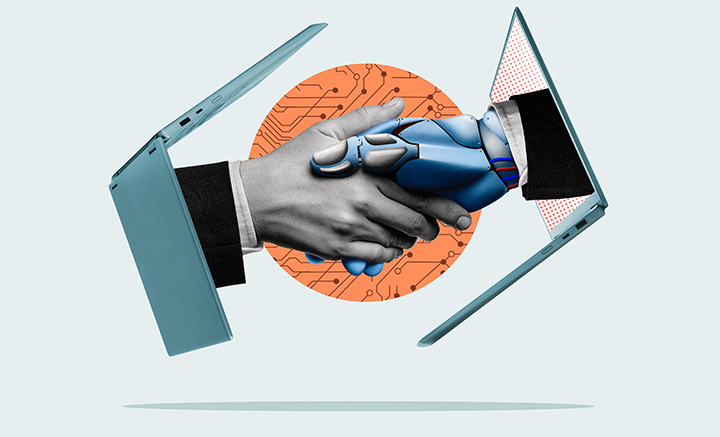9 Human and LLM collaboration

AI is rapidly progressing and the ability to scan the horizon for future applications of AI is critical to understand where advances in AI might impact on law and the delivery of legal services.
Horizon scanning can assist us in assessing the opportunities and risks that emerge from new developments. LLMs have the capability to undertake a wide range of tasks, but there are still limitations with the models such as hallucinations and biases. An area of growing interest is how we develop and achieve effective human and LLM collaboration (Passerini et al, 2025).
As we consider deeper integration of LLMs, we need to think about how human and machine intelligence interact.
At one end of the spectrum, humans retain full decision-making control – at the other, LLMs entirely replace human involvement. Faggioli et al. (2024) suggest a model for human and machine collaboration.
Click on each label below to learn more.
As LLMs continue to evolve, organisations must continually evaluate the human and AI interaction and, as discussed in Course 4 and 6, make sure there are systems in place to document changes. The rise of GenAI is driving the next major transformation – the emergence of AI agents. AI agents are different because they can complete tasks independently of humans (Kolt, 2025).
Yee et al. (2024) argue that they are the new frontier of GenAI:
“Broadly speaking, 'agentic' systems refer to digital systems that can independently interact in a dynamic world.
“While versions of these software systems have existed for years, the natural-language capabilities of gen AI unveil new possibilities, enabling systems that can plan their actions, use online tools to complete those tasks, collaborate with other agents and people, and learn to improve their performance.
“Gen AI agents eventually could act as skilled virtual coworkers, working with humans in a seamless and natural manner. A virtual assistant, for example, could plan and book a complex personalized travel itinerary, handling logistics across multiple travel platforms.
“Using everyday language, an engineer could describe a new software feature to a programmer agent, which would then code, test, iterate, and deploy the tool it helped create.”
Microsoft announced in October 2024 that it was introducing new agentic capabilities within Copilot, Google has Google Cloud Vertex AI Agent, Meta have developed CICERO, and all the other tech companies are developing AI agents.
AI agents rely on LLMs, so they give rise to the same risks of bias, hallucinations, and privacy issues which are likely to lead to new legal and ethical challenges.
With these rapid changes, it is important to keep yourself informed, and to understand how technological changes are likely to impact you as an individual and the organisation you work for.
8 Will AI make us more or less wise?



